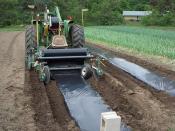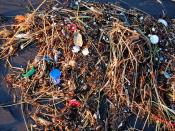Extensions of knowledge do not always enlarge our capacity for control. This holds true for our relation to nature, some of whose phenomena are alterable by man while others are not. Despite all increase in our information about heavenly phenomena, some lie entirely beyond human influence. For instance a geologist studies the nature of the earthquakes but he cannot cause or prevent this occurrence. In some cases, we are ourselves the determinants of nature, since the use we make of natural forces produces the result we have caused. One such recent matter is the use of plastic.
The term "plastics" covers a range of synthetic or semi-synthetic organic condensation or polymerization products that can be molded or extruded into objects or films or fibers. They consist of long chains of polymers. Their name is derived from the fact that in their semi-liquid state they are malleable, or have the property of plasticity.
Plastics vary immensely in heat tolerance, hardness, and resiliency. Combined with this adaptability, the general uniformity of composition and lightness of plastics ensures their use in almost all industrial applications today
Today plastics have replaced metals, natural fibres and hides, paper wood and stone and glass ceramics. Manufacturers use these plastics to make their products stronger, lighter, inexpensive and durable. Plastics' versatility is responsible for its many uses: everything from car parts to doll parts, from soft drink bottles to the refrigerators they get stored in. From the car you drive to work in to the television you watch when you get home, plastics help make your life easier and better.
Plastic bottles mean we can actually lift an economy-size bottle of juice. And should we accidentally drop that bottle, it is shatter-resistant. Plastics also help to conserve energy in our homes. Vinyl siding and windows...


